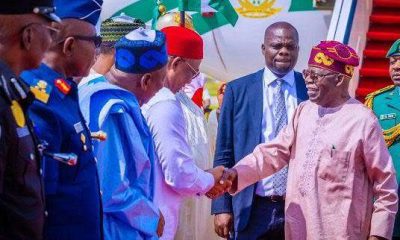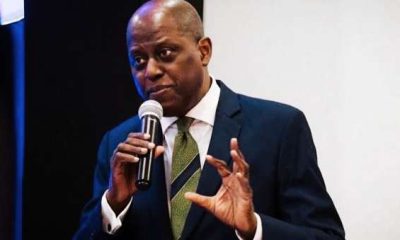Headlines
2023: Tinubu treads an uncertain path to Aso Rock

By OBINNA EZUGWU
Bola Ahmed Tinubu, presidential candidate of the All Progressives Congress (APC) will head into the February 2023 presidential poll as perhaps the favourite. The former Lagos governor is running on the platform of a ruling party, and threading on an already carved pathway; one that saw Muhammadu Buhari emerge president in 2015, after three failed attempts in 2003, 2007 and 2011. But the question is, how certain will this path be for Tinubu in 2023?
In 2015, Buhari who had emerged victorious in most of the core northern states since 2003, but constantly fell short, eventually succeeded after building an alliance with the Tinubu-led Southwest; one that birthed the APC in 2013. And after eight years, and two permissible terms of office, he’s set to bow out, and Tinubu, for the role he played in helping him to power, is poising to be his successor, and hoping to build on the same North-Southwest political alliance; one that now seeks to dominate the country’s political space, inadvertently, to the exclusion of other regional blocs.
”We are people of honour, we should honour our pledge and promise. This is payback time for the north to support Tinubu,” Kashim Shettima, Tinubu’s running mate declared when he visited the Hausa community in Alaba-Rago, in Iba Local Council Development Area (LCDA), on Wednesday in Lagos.
Shettima, a former governor of Borno State, emphasized that Tinubu made Buhari president in 2015 by giving him bloc votes from the Southwest, a feat he repeated in 2019, even as according to him, he had previously provided the platform for Atiku Abubakar, now candidate of the Peoples Democratic Party (PDP) to contest the presidential election when he was chased out of the main opposition party; the same thing he did for Nuhu Ribadu, former chairman of the Economic and Financial Crimes Commission (EFCC).
Abdullahi Ganduje, governor of Kano State, who was also part of the entourage, declared that as far as the north was concerned, “the issue of Tinubu is concluded.”
He said, ”Kano State wants votes from you for Tinubu. You have to promise us you will surpass Kano in your votes for Tinubu.”
For Tinubu therefore, the path to presidency is building on the two regional alliance established in 2015, and for good reason. The Northwest and his native Southwest, which are the two principal partners in the alliance, share a combined voting strength of 39.6 million of the total number of 91.9 million registered voters going into 2023.
Tinubu expects to lock down both zones, even as he looks forward to securing majority votes in the Northeast, the home zone of Atiku Abubakar, the PDP candidate, as well as his running mate, Shettima, which boasts of 12.5 million voters, and perhaps a chunk of the North Central, with 15 million registered voters, a combination of which would see him in Aso Rock on May 29, 2023.
Evidently, with the above calculation in mind, the APC candidate has since structured his campaign around the North and the Southwest, and has made only little effort to sell his candidacy to the traditional PDP zones of the Southeast and South South, whose combined voting strength of 24.7 million – Southeast 10.5 million and South South 14.2 million – will, he would imagine, not play such significant role in determining his electoral fate in 2023.
Tinubu had after touring the northern states to consult with party leaders, allegedly summoned those of the Southeast to meet him in Abuja, an invitation they reciprocated by snubbing; even as he failed to attend a rally organised for him by party stakeholders in Delta State last week.
“From his body language, it’s obvious that Tinubu doesn’t think that the South South and the Southeast matter in his calculation,” said Chidi Anthony, a lawyer and public affairs commentator. “If I want to excuse him, I will say his reason is that those are traditional PDP zones, and with Peter Obi in the picture, the chances of APC is even much slimmer.
“But I don’t think it’s a good strategy, and frankly it looks to me that he’s ignoring the zones out of possible spite, because what normal candidates do is to try to sell themselves where they are not already popular like Obi is doing in the north.”
Buhari, in 2015, took power after sweeping votes in the Northwest, Southwest, North East, and much of North Central, and heading into the polls next year, Tinubu would hope to replicate the president’s feat. This had informed his decision to opt for a Muslim-Muslim ticket, in a country that shares a roughly even Muslim and Christian population, and where religious tensions have heightened in recent years.
He would be buoyed by recent projections by both the Economist Intelligence Unit and Fitch, both of which in their respective analysis, tipped him to win the the presidential election.
“We maintain our view that the ruling party’s Bola Ahmed Tinubu is the candidate most likely to win the presidential election as a split opposition vote will favour the APC,” Fitch stated in a report a fortnight ago.
“Protests and social discontent are likely to ramp up in the aftermath of a Tinubu win since this would end the recent trend of the presidency alternating between Muslims and Christians.
“Since Nigeria’s return to democracy in 1999, there has been an informal agreement that resulted in the presidency alternating between northern and southern states, as well as between Christians and Muslims.
“A win for Tinubu would break with this unwritten tradition and likely fuel sentiment of perceived marginalisation among Christians.”
The firm further noted that Obi, presidential candidate of the Labour Party, would not win despite some polls predicting that he would emerge president.
Citing a 2020 World Bank report, Fitch said only 36 percent of Nigerians use the internet where there is huge traction to Obi.
“Surveys showing that Obi is ahead of his opponents, Bola Tinubu (APC) and Atiku Abubakar (PDP), were mostly based on responses gathered online,” it reads.
“Since only 36.0% of Nigerians use the Internet (World Bank, 2020), we believe that these results are skewed towards urban, affluent voters who are most likely to support Obi. We also highlight that these polls suggest that a large share of voters remain undecided.”
Similarly, the Economist Intelligence Unit, a UK-based platform, in its country report in September, said the controversy of the Muslim-Muslim presidential ticket will not affect Tinubu’s chances in the elections.
“We expect Tinubu to take the presidency, and recent developments have only reinforced our thinking. It does not appear that a Muslim-Muslim ticket will weigh significantly on Tinubu’s electoral chances,” EIU said.
On the chances of Atiku at the polls, the report said the PDP candidate has cause to worry over the feud with Nyesom Wike, governor of Rivers, adding that heshould also be worried about how Obi will balkanise the traditional votes of the PDP in the Southeast.
“Atiku has more cause to worry. Not only is Obi eating into the PDP’s South-eastern support base, but Governor Wike, who finished second in the primary, does not appear to be interested in endorsing him,” the report said.
But Tinubu’s path is unlikely to be as straight as the projections by the two institutions made it out to be. Importantly, they appear to ignore the complexities of Nigeria’s local politics, and especially the anger the failure of the ruling party to tackle mounting insecurity and reign in on inflation has caused.
Mr. Obi, who has emerged as the preferred candidate of the disillusioned youth population, has continued to trounce other candidates at various opinion polls, a little more than three months to the election.
In the North where Tinubu hopes to inherit Buhari’s numbers, both Atiku of PDP and Rabiu Musa Kwankwaso, candidate of the New Nigeria People’s Party (NNPP) are huge factors and can be confident of taking substantial amounts of votes, even if, in the case of Kwankwaso, a former governor of Kano State, there would be questions about him having enough national spread to stand a chance of winning.
Tinubu is expected to win his Southwest zone by good margin, especially as campaigns may become increasingly ethnic, even if Obi has the backing of a reasonable number of the elite population in the zone, and Atiku’s PDP has two states there.
However, the former Lagos governor’s headache will be how much he would be able to replicate Buhari’s numbers in the north.
The president who has street popularity in the region, has since promised to lead Tinubu’s campaign, which is is big plus for him. But the president won’t be on the ballot, and Tinubu may not get the sort of numbers the president has pulled over the years, particularly given that Atiku and Kwankwaso are from the region, and the discontent over his Muslim-muslim ticket has alienated the substantial Christian population across the north.
In 2019, Buhari beat Atiku by wide margin across the Northeast and Northwest to retain power, even as many continue to contest that the former vice president was denied victory by certain manipulations.
The margin of the president’s victory is reproduced below:
Buhari = 1,232,133
Atiku = 308,056.
Margin: 924,077
Kano
Buhari = 1,464,768
Atiku = 391,593.
Margin= 1,073,175
Niger:
Buhari = 612,371
Atiku = 218,052.
Margin= 394,319
Jigawa:
Buhari = 794738
Atiku = 289895
Margin: 505,843
Zamfara
Buhari= 438,682
Atiku= 125,423
Sokoto
Buhari= 445, 275
Atiku= 328,411
Margin= 116,864
Kebbi
Buhari = 673,717.
Atiku = 106,633.
Margin: 567,084
Bauchi
Buhari = 798,428.
Atiku = 209,313
Margin: 589,115
Adamawa (Atiku)
Buhari = 377,488.
Atiku = 412, 266
Margin: 34,778
Gombe
Buhari = 403,961.
Atiku = 138,484
Margin: 265,477
Yobe:
Buhari = 497,914.
Atiku = 50,763
Margin: 444,151
Borno
Buhari = 836,496.
Atiku = 71,788
Margin: 764,708
Tinubu would need to replicate these numbers to a certain degree to be sure of victory. He has the huge advantage of having most of the governors in the region backing him, which gives him an edge over Atiku and Kwankwaso, and from available feedback, the former Lagos governor is popular in places like Kano, but it remains in doubt that he can match Buhari’s margins.
” I’ve been in Kano for almost a month now. I sincerely didn’t expect how many people respond when we discussed about Tinubu. If not for tribal influences, Tinubu would’ve shocked people in Kano. He’s being underrated in my opinion,” noted a social media commentator, Shuayb, @Iam_shuayb.
There’s been talks about the possibility of Kwankwaso eventually joining forces with Tinubu, which he has denied, but in the event of that happening, it is sure to open the doors for the former Lagos governor.














mickykarim
November 7, 2022 at 1:09 pm
ABAT KNEW HIS ONIONS AND HAS OILED HIS MACHINERY OF HIS POLITICAL MASTERY SINCE BEFORE 1999.
Tinubu did not just wake up to the opportunity of leading a great nation like Nigeria, while others and opportunist are just waking up to the time. https://www.nairaland.com/6976395/service-beckons
THIS REPORTAGE IS BALANCE AND REALISTIC AND BOLSTERED BY THE EMBEDED.